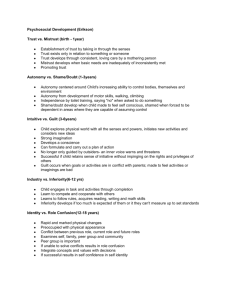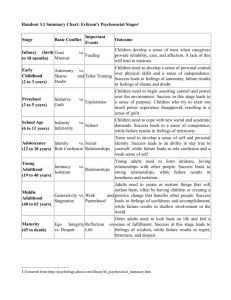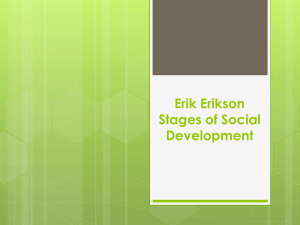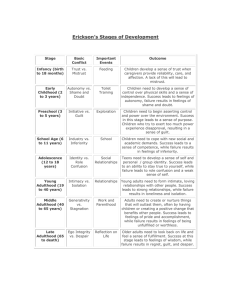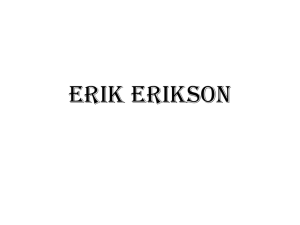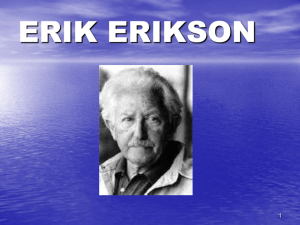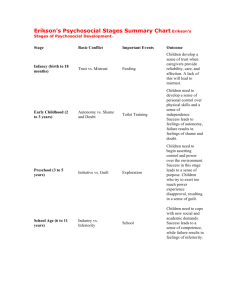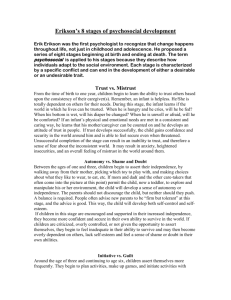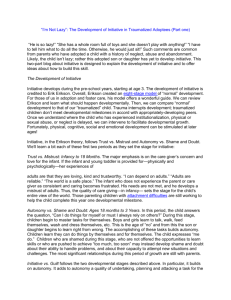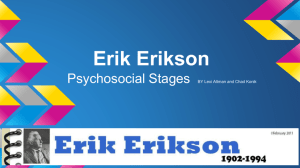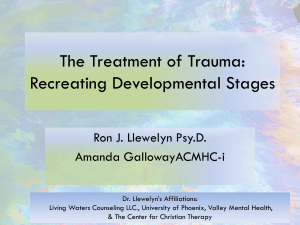Stages of child development
advertisement
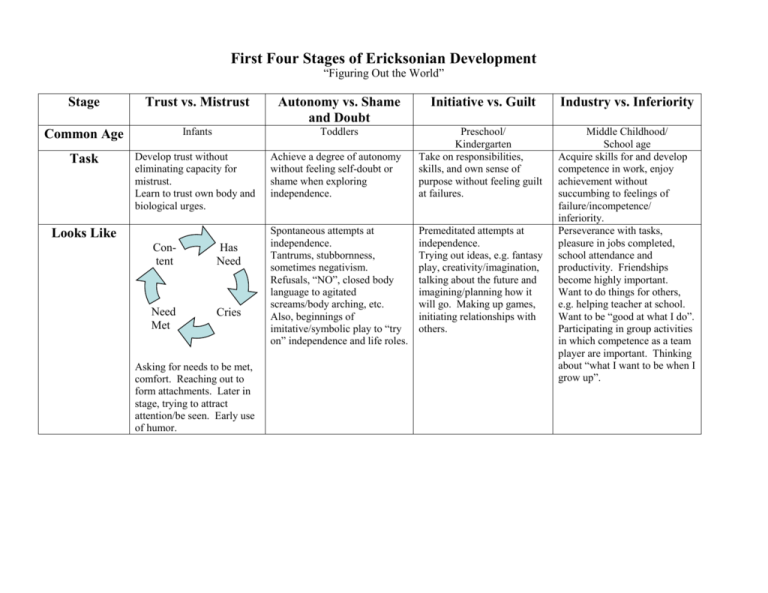
First Four Stages of Ericksonian Development “Figuring Out the World” Stage Trust vs. Mistrust Autonomy vs. Shame and Doubt Initiative vs. Guilt Industry vs. Inferiority Common Age Infants Toddlers Task Develop trust without eliminating capacity for mistrust. Learn to trust own body and biological urges. Preschool/ Kindergarten Take on responsibilities, skills, and own sense of purpose without feeling guilt at failures. Middle Childhood/ School age Acquire skills for and develop competence in work, enjoy achievement without succumbing to feelings of failure/incompetence/ inferiority. Perseverance with tasks, pleasure in jobs completed, school attendance and productivity. Friendships become highly important. Want to do things for others, e.g. helping teacher at school. Want to be “good at what I do”. Participating in group activities in which competence as a team player are important. Thinking about “what I want to be when I grow up”. Looks Like Content Has Need Need Met Cries Asking for needs to be met, comfort. Reaching out to form attachments. Later in stage, trying to attract attention/be seen. Early use of humor. Achieve a degree of autonomy without feeling self-doubt or shame when exploring independence. Spontaneous attempts at independence. Tantrums, stubbornness, sometimes negativism. Refusals, “NO”, closed body language to agitated screams/body arching, etc. Also, beginnings of imitative/symbolic play to “try on” independence and life roles. Premeditated attempts at independence. Trying out ideas, e.g. fantasy play, creativity/imagination, talking about the future and imagining/planning how it will go. Making up games, initiating relationships with others. Stage Trust vs. Mistrust Autonomy vs. Shame and Doubt Initiative vs. Guilt Industry vs. Inferiority Caregivers Can/Should Provide familiarity, consistency, continuity so child will feel that world is a safe place to be, that people are reliable and loving. Meet needs as they arise. OK to have some delayed gratification as time goes on. Encourage children to try out their ideas, accept fantasy and curiosity and imagination. Imagine future situations with child, explore his ideas and action plans with him. Encourage and praise initiative. Encourage and reinforce initiative, industriousness. Recognize and honor effort and accomplishments. Give developmentally appropriate opportunities for participation in chores, school “jobs”, team play, community participation. Successful Resolution Develop hope, belief that even when things are not going well, they will work out in the end. Develop ability to delay gratification short-term, belief that someone will help soon. Permit child to explore and manipulate the environment; should neither push nor discourage (balance). Be firm but tolerant, patient enough to let them try things for themselves. Send the message that they are skilled enough to give things a try, be more independent. Either over-restriction or overpermissiveness can lead to problems. Develop self-control (selfregulation) and self-esteem. “Can do” attitude, willpower, determination (as approach Initiative stage). Develop strength of purpose, courage, capacity for action, understanding of limitations and past failings. Welldeveloped imagination, good fantasy play skills. Cooperation with others, ability to lead and follow. Moral and faith development (ability to judge self and others as wrong/right). Optimism, belief that perseverance leads to success enough of the time to try. Develops fearfulness, can become social outsider/”follower”, overly dependent on adults, restricted in development of play and imagination, sense of guilt, lack of purpose. Develop pride in their accomplishments, confidence in abilities. Feel desirable as a friend/peer/part of family, team, community. Hopeful about ability to be productive in the world in the future. Suspended Resolution Feeling suspicious, apprehensive, insecure, mistrusting. Giving up, with assumption that they cannot and should not act on their own. Feeling ashamed that they tried and/or failed. Doubting their abilities to function in the world. Feelings of inferiority, incompetence, helplessness, hopelessness, “underachiever”. Can become over-responsible when develop too much competency, become “adultified”, not playful, histrionic in style.

